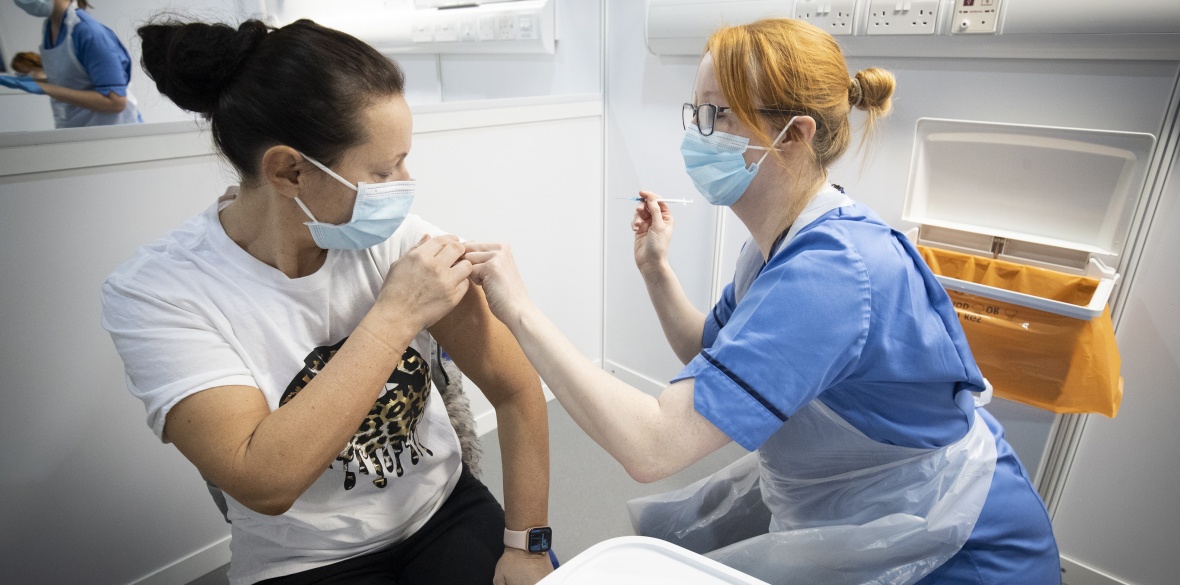This is the last article you can read this month
You can read more article this month
You can read more articles this month
Sorry your limit is up for this month
Reset on:
Please help support the Morning Star by subscribing here
BORIS JOHNSON continues to dither on committing to a decision on vaccine passports but the latest murmurs from Camp Tory are that some form of the scheme will be in place by the end of September.
Many will welcome the move, including those left of the Tories — but it would be foolish to imagine vaccine passports will be without impact — several human rights campaigners and respected institutions have already flagged them as a major cause for concern.
Liberty has dubbed the scheme “an overreach on our rights,” stating that passports won’t protect us and will fail to extricate us from the pandemic.
They’re not the only ones — the Commons public administration and constitutional affairs committee claims that, “based on race, religion, age and socio-economic background,” they’re likely to “disproportionately discriminate,” while the World Health Organisation warns they’ll “deepen inequities and promote differential freedom of movement.”
Implementing a two-tier system that bars people from accessing services further marginalises minority groups, within which there lies a percentage who will be hesitant to vaccinate, due to historical precedent and distrust in the current government.
Then there’s those who volunteered to be part of the trials which helped us develop the vaccines in the first place — participants have already claimed they’ve been refused travel where proof of vaccination is required, as they received jabs such as Valneva, which are not currently recognised.
Many of these participants have antibodies to Covid which have been confirmed by blood tests, but their vaccines have not yet received official approval.
This poses a problem — if they get vaccinated again, they face breaking the trial protocol, and wasting the blood samples that have already been taken, that could be used for life-saving medical research.
But if they fail to do so, they’ll be unfairly penalised, as they would not be considered vaccinated under Boris Johnson’s proposed scheme.
The premise of a digital ID system, which is essentially what the vaccine passport scheme will become, has been long considered incompatible with any rights respecting society and has been repeatedly and resoundingly rejected by the public.
There is a good reason for this — our rights are hard won and important. This shouldn’t change because of Covid.
There’s a serious risk that once a scheme like this is in place, it won’t ever be repealed.
Even if the Tories don’t extend the scheme indefinitely, setting proof of vaccination as a precedent could lead to other businesses and institutions making it a requirement in exchange for access, even if they aren’t mandated to do so by the government.
This will prevent many people from accessing essential services, work or housing and would largely affect the poor, the homeless, domestic violence victims and minority groups.
Existing problems with inequitable hiring processes, as well as discriminatory housing applications, would be seriously exacerbated — those who are in most need would not receive the help they so urgently require.
Once vaccine passports are introduced, might we see a situation where refugees without valid certificates could be denied safe haven, if they either haven’t had the opportunity to vaccinate, or they refuse to vaccinate?
Given the dire global situations they’re fleeing from, like the Afghanistan crisis, this would further worsen what’s already a humanitarian disaster.
Johnson announced back in July that when the scheme is implemented, only the double vaccinated will be allowed entry to “venues where large crowds gather” but he has not yet formally confirmed the details of the system.
Health Secretary Sajid Javid has stated that “no final policy decision” has been made on vaccine passports, but as recently as August 2021, Business Secretary Kwasi Kwarteng stated that they are “certain to happen.”
Despite the merits of the argument that it’s not fair to give the same freedoms to those who’ve refused to vaccinate, it’s vital to consider a number of factors when deciding whether to implement such a potentially discriminatory system of ID.
The Tories’ handling of the pandemic, the cuts they’ve made to benefits and essential services, and the highly polarised political environment the government has often encouraged are not trivial aspects, and they’ll all affect the outcome of any digital ID scheme that’s based on vaccination status.
Implementing a two-tier system with such ability to discriminate will heavily impact the most vulnerable groups, like the homeless and the undocumented, who despite their vaccination status need more access to public life, not less.
Understanding why some are vaccine hesitant may be difficult, but it’s important to remember that not everyone is reluctant due to conspiracy theories, or from listening to political grifters attempting to gain relevance.
There’s a long history of medical atrocities that have been carried out upon minority groups by the medical establishment — and there’s a continuing hostility towards minorities from the current government, including the Gypsy and Roma communities, as well as those from black and Asian groups.
There’s something else to consider too, given the most current data on the delta strain, and how it’s transmitted.
A University of Oxford study recently discovered the vaccinated carry the same amount of the virus in their nostrils as the unvaxxed, though an Imperial College London study does show they are still less likely to catch it.
Delta is wreaking havoc, despite the decreased risk to contracting Covid that the vaxxed wield. Though at the August Boardmasters event in Newquay only the vaccinated, or those who had natural immunity or a negative lateral flow test, were permitted entry, 4,700 cases of coronavirus are suspected of being linked to the festival.
This must beg the question — will vaccine passports even help us to combat delta?
Britain’s NHS electronic proof of vaccination pass isn’t problem-free either — there are major issues synching data to the EU’s tracking system, and as a result, many people who have been jabbed have not received a valid permit to travel.
Given the potential impact on vulnerable groups, and the Tories’ bungled approach to the NHS Covid pass, it would surely be a misstep to let Johnson’s government further erode our rights via an ID system that determines who gets to do what, where, without at least guaranteeing an end date to the scheme?
This government has already abused its powers, quashing the right to protest by passing the much-contested Police, Crime, Sentencing and Courts Bill.
As they’ve not even stated when they would plan to end the vaccine passport scheme, or how long they think it will need to be in place, they’ve left little opportunity for the opposition to formally debate this aspect.
Neither has there been any public consultation. The chance to submit evidence to the government on Covid certification closed back in March, prior to when vaccine passports were being seriously mooted.
We’re at a pivotal point in time — after the vaccine passport scheme has been rolled out, it will be far harder to address any issues that arise.
Before unprecedented powers are handed over to a government that has arguably failed to protect people, and uphold their rights, we must demand a full public consultation and a political debate to prevent a major assault on liberty that could have lasting ramifications.










